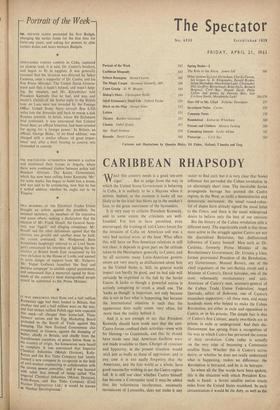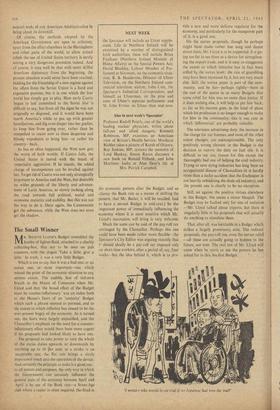CARIBBEAN RHAPSODY
HAT this country needs is a good ten-cent cigar.' . . . But to judge from the way in which the United States Government is behaving in Cuba, it is unlikely to be a Havana when it arrives. Indeed, at the moment it looks all too likely to be the kind that blows up in the smoker's face, to the great merriment of the bystanders.
It is very easy to criticise President Kennedy, and to some extent the criticisms are well- founded. For him to have permitted, even encouraged, the training of anti-Castro forces for the invasion of Cuba on American soil was a very bad tactical error, at the least. What effect this will have on Pan-American relations is still not clear; it depends in great part on the attitude taken in the Hemisphere generally to Castro, and by all accounts many Latin-American govern- ments are very nearly as disillusioned about him as the United States is. Still, its general world impact can hardly be good, and its bad side will certainly be exploited to the full by the Soviet Union. It looks as though a powerful nation is actively conspiring to crush a small one. The 'looks as though' is important, not only because this is not in fact what is happening, but because the international situation is such that the appearance does really count, very often, for more than the reality behind it.
And it is not enough to say that President Kennedy should have made sure that the anti- Castro forces confined their activities—even with his blessing—to Guatemala, and that he should have made sure that American facilities were not made available to them. Charges of cynicism and hypocrisy, in the present situation. would stick just as badly as those of aggression: and in any case it is too easily forgotten that the Americans, and the free world as a whole, have good reasons for wishing to see the Castro regime fall. It is still not clear whether Castro himself has become a Communist (and it maybe added that his voluminous incoherence, ominously reminiscent of Lumumba, does not make it any easier to find out); but it is very clear that Soviet influence has pervaded the Cuban revolution in an alarmingly short time. The inevitable Soviet propaganda barrage has painted the Castro regime, in the West, as (still) a humanitarian and democratic movement; the usual round-robin- ful of dupes have already signed the usual letter to the Times, and there is the usual widespread desire to believe only the best of our enemies.
But the history of the Cuban revolution tells a different story. The unpalatable truth is that those most active in the struggle against Castro are not the discredited Batististas, but disillusioned followers of Castro himself. Men such as Dr. Cardona, formerly Prime Minister of the Revolutionary Government; Dr. Urrutia y Lleo, former provisional President of the Revolution- ary Government; Manuel Revero, one of the chief organisers of the anti-Batista revolt and a Minister of Castro's; David Salvador, one of the most vehemently revolutionary and anti- American of Castro's men, secretary-general of the Cuban Trade Union Federation; Angel Quevedo, editor of Bohemia, one of Castro's staunchest supporters;—all these men, and many hundreds more who helped to make the Cuban Revolution, are either in exile and opposition to Castro, or in his prisons. The simple fact is that et Castro's first Cabinet, nearly two-thirds are in prison, in exile or underground. And their dis- illusionment has sprung from a recognition of the way in which Castro has perverted the course of their revolution. Cuba today is actually on the very edge of becoming a Communist satellite State. Whether this is Castro's active desire, or whether he does not really understand what is happening, makes no difference; the Revolution is betrayed, and he is its betrayer.
So when all the fine words have been spoken, this is the situation with which President Ken- nedy is faced: a Soviet satellite nation ninety miles from the United States mainland. In such circumstances it would be the duty, as well as the
natural wish, of any American Administration to bring about its downfall.
Of course, ' the methods adopted by the American Government are open to criticism; apart from the effect elsewhere in the Hemisphere and other parts of the world, to allow armed rebels the use of. United States territory is surely setting a very dangerous precedent indeed. And of course, it may well be that with more skilful American diplomacy from the beginning, the present situation would never have been reached; bidding for the friendship of a new regime against the offers from the Soviet Union is a hard and expensive pastime, but it is one which the free world has simply got to play. How early Castro began to feel committed to the Soviet bloC is difficult to say; but from all the signs he was not originally so disposed, and it would have been worth America's while to put up, with greater humiliations, and dig even deeper into her pocket, to keep him from going over, rather than be compelled to resort now to these desperate and bloody expedients to bring him—or rather his country—back.
As has so often happened, the West now gets the worst of both worlds. If Castro falls, the United States is tarred with the brush of imperialist aggression. If he stands, the added charge of incompetence can be levelled against her. To get rid of Castro was not only strategically important to America and the West, but desirable on wider grounds of the liberty and ,advance- ment of Latin America, so slowly inching along the road towards full political, social and economic maturity and stability. But this was not the way to do it. Once again, the Communists get the substance, while the West does not even get the shadow.















































 Previous page
Previous page